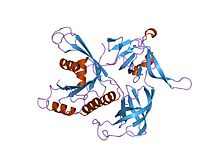GTP-binding elongation factor family, EF-Tu/EF-1A subfamily
| Elongation factor Tu GTP binding domain | |||||||||
|---|---|---|---|---|---|---|---|---|---|
 eif2gamma apo | |||||||||
| Identifiers | |||||||||
| Symbol | GTP_EFTU | ||||||||
| Pfam | PF00009 | ||||||||
| Pfam clan | CL0023 | ||||||||
| InterPro | IPR000795 | ||||||||
| PROSITE | PDOC00273 | ||||||||
| SCOP2 | 1etu / SCOPe / SUPFAM | ||||||||
| CDD | cd00881 | ||||||||
| |||||||||
| Elongation factor Tu domain 2 | |||||||||
|---|---|---|---|---|---|---|---|---|---|
 eif2gamma apo | |||||||||
| Identifiers | |||||||||
| Symbol | GTP_EFTU_D2 | ||||||||
| Pfam | PF03144 | ||||||||
| InterPro | IPR004161 | ||||||||
| PROSITE | PDOC00273 | ||||||||
| SCOP2 | 1etu / SCOPe / SUPFAM | ||||||||
| CDD | cd01342 | ||||||||
| |||||||||
| Elongation factor Tu C-terminal domain | |||||||||
|---|---|---|---|---|---|---|---|---|---|
 whole, unmodified, ef-tu(elongation factor tu). | |||||||||
| Identifiers | |||||||||
| Symbol | GTP_EFTU_D3 | ||||||||
| Pfam | PF03143 | ||||||||
| InterPro | IPR004160 | ||||||||
| SCOP2 | 1etu / SCOPe / SUPFAM | ||||||||
| CDD | cd01513 | ||||||||
| |||||||||
In molecular biology, the GTP-binding elongation factor family, EF-Tu/EF-1A subfamily is a family of elongation factors, which includes the eukaryotic eEF-1 and the prokaryotic EF-Tu.
These proteins consist of three structural domains: the GTP-binding domain, and two oligonucleotide binding domains that are often referred to as domain 2 and domain 3.
The GTP-binding domain has been shown [1] to be involved in a conformational change mediated by the hydrolysis of GTP to GDP. This region is conserved in both EF-1alpha/EF-Tu and also in EF-2/EF-G and thus seems typical for GTP-dependent proteins which bind non-initiator tRNAs to the ribosome. The GTP-binding protein synthesis factor family also includes the eukaryotic peptide chain release factor GTP-binding subunits [2] and prokaryotic peptide chain release factor 3 (RF-3);[3] the prokaryotic GTP-binding protein lepA and its homologue in yeast (GUF1) and Caenorhabditis elegans (ZK1236.1); yeast HBS1;[4] rat statin S1;[5] and the prokaryotic selenocysteine-specific elongation factor selB.[6]
Domain 2 adopts a beta-barrel structure, and is involved in binding to charged tRNA.[7] This domain is structurally related to the C-terminal domain of EF2, to which it displays weak sequence similarity. This domain is also found in other proteins such as translation initiation factor IF-2 and tetracycline-resistance proteins.
Domain 3 represents the C-terminal domain, which adopts a beta-barrel structure, and is involved in binding to both charged tRNA and to EF1B (or EF-Ts).[8]
References
- ^ Moller W, Schipper A, Amons R (September 1987). "A conserved amino acid sequence around Arg-68 of Artemia elongation factor 1 alpha is involved in the binding of guanine nucleotides and aminoacyl transfer RNAs". Biochimie. 69 (9): 983–9. doi:10.1016/0300-9084(87)90232-X. PMID 3126836.
- ^ Stansfield I, Jones KM, Kushnirov VV, Dagkesamanskaya AR, Poznyakovski AI, Paushkin SV, Nierras CR, Cox BS, Ter-Avanesyan MD, Tuite MF (September 1995). "The products of the SUP45 (eRF1) and SUP35 genes interact to mediate translation termination in Saccharomyces cerevisiae". EMBO J. 14 (17): 4365–73. PMC 394521. PMID 7556078.
- ^ Grentzmann G, Brechemier-Baey D, Heurgué-Hamard V, Buckingham RH (May 1995). "Function of polypeptide chain release factor RF-3 in Escherichia coli. RF-3 action in termination is predominantly at UGA-containing stop signals". J. Biol. Chem. 270 (18): 10595–600. doi:10.1074/jbc.270.18.10595. PMID 7737996.
{{cite journal}}: CS1 maint: unflagged free DOI (link) - ^ Nelson RJ, Ziegelhoffer T, Nicolet C, Werner-Washburne M, Craig EA (October 1992). "The translation machinery and 70 kd heat shock protein cooperate in protein synthesis". Cell. 71 (1): 97–105. doi:10.1016/0092-8674(92)90269-I. PMID 1394434.
- ^ Ann DK, Moutsatsos IK, Nakamura T, Lin HH, Mao PL, Lee MJ, Chin S, Liem RK, Wang E (June 1991). "Isolation and characterization of the rat chromosomal gene for a polypeptide (pS1) antigenically related to statin". J. Biol. Chem. 266 (16): 10429–37. PMID 1709933.
- ^ Forchhammer K, Leinfelder W, Bock A (November 1989). "Identification of a novel translation factor necessary for the incorporation of selenocysteine into protein". Nature. 342 (6248): 453–6. doi:10.1038/342453a0. PMID 2531290.
- ^ Nissen P, Kjeldgaard M, Thirup S, Polekhina G, Reshetnikova L, Clark BF, Nyborg J (December 1995). "Crystal structure of the ternary complex of Phe-tRNAPhe, EF-Tu, and a GTP analog". Science. 270 (5241): 1464–72. doi:10.1126/science.270.5241.1464. PMID 7491491.
- ^ Wang Y, Jiang Y, Meyering-Voss M, Sprinzl M, Sigler PB (August 1997). "Crystal structure of the EF-Tu.EF-Ts complex from Thermus thermophilus". Nat. Struct. Biol. 4 (8): 650–6. doi:10.1038/nsb0897-650. PMID 9253415.
